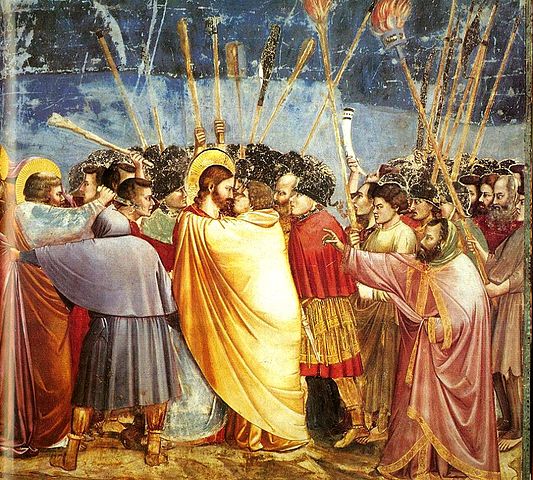What do you make of Judas?
Wouldn’t that make an interesting interview question for a parish search committee to ask? How a person answers could say a lot about both their theology and their understanding of Christian community.
In Mark’s account of the Last Supper, Judas is right there with the rest of the disciples, eating of the body and drinking of the blood of Christ. He is bound to the community, an intrinsic part of it. And yet Jesus says of him that it would be better if he had never been born. There is a real tension here between belonging and exclusion, between being chosen and being rejected, and between fulfilling of prophesy and acting out the wrong choices.
Jesus will go “as it is written of him”. Does the living out of his destiny require that there be a betrayer? Did he choose Judas on purpose for that function? Must the person who turns him over to the powers of the world be his close friend? Did Judas’ decision to do this gradually evolve, and did Jesus watch it happen, powerless to intervene? Did he forgive Judas?
In the Christian communities of which I have been a part, bad things have happened. Sometimes they have been really big bad things; people have betrayed one another in catastrophic ways. When this occurs the whole congregation can become disillusioned. “How can this happen in a church?” we wonder. “What did we do wrong? What does it mean about our basic values and practices?”
To go on together we have to resolve these questions in one way or another. Perhaps we find a scapegoat. “If it weren’t for that nasty Joe Blow, this would never have happened.” Or – and this is more healthy – we take a look at where we as a community are breeding dysfunction. Do we communicate poorly? Do we allow certain people to dominate? Are we like an ostrich, hiding our collective head in the sand?
Maybe we get a consultant to help us figure out how to work better with one another. Maybe we really turn over the rocks and find out what unsavory things we need to bring into the light of day and talk about. Maybe we also reaffirm our basic Christian value, to love one another as Christ loves us.
But, maybe betrayal in one form or another is also part of being Christian. What do we accept from one another that we probably shouldn’t? When is each of us a Judas, and what dynamics of community living bring us to that point? How can we forgive the unforgivable in ourselves and one another while at the same time working to make betrayal less likely?
Judas is our beloved, part of the Body of Christ. Judas is right here with us, in those we love most, and in ourselves as well. The Body of Christ includes the betrayer. What do we make of that fact? What do we allow it to teach us?
Laurie Gudim is a writer and religious iconographer who lives in Fort Collins, CO. You can view some of her work at Everyday Mysteries.
Image: “Giotto – Scrovegni – -31- – Kiss of Judas” by Giotto. Licensed under Public Domain via Wikimedia Commons

